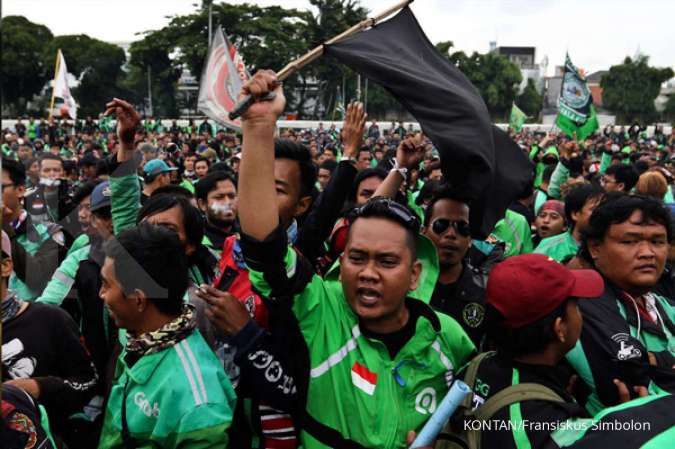JAKARTA. Indonesia aims to learn from China in the area of consumer protection, facilitated by a new deal signed between trade officials from both countries on Monday. Under the memorandum of understanding (MoU) inked by the National Consumer Protection Agency (BPKN) and China’s State Administration for Industry and Commerce (SAIC), Indonesia will exchange information with China — particularly on regulations and dispute settlement practices — and will cooperate in personnel training, according to Deddy Saleh, a member of the agency. Deddy said that the new collaboration would allow Indonesia to improve its domestic infrastructure, to better serve consumers of goods and services, based on lessons learned from China. “As Indonesia’s economy is quite similar to that of China, it will be easier for us to compare and to learn from each other in the area of consumer protection as the gap is not too wide,” he told reporters after the signing of the agreement. Deddy said that compared to Indonesia, consumer protection in China had been much advanced due to the massive presence of government-funded dispute settlement bodies, strong consumer protection laws and active consumer surveillance of business players. The new cooperation comes at a time when the government plans to revise the 1999 Consumer Protection Law. One of the loopholes in the law is that the coverage is limited only to goods, while in fact consumers also face problems when buying services from service providers. As a result, the law does not guarantee consumers’ interests when, for example, patients do not get proper services from a hospital. The law also lacks a proper definition of consumers, as it is restricted to end-consumers, thereby excluding intermediate-consumers such as manufacturers of goods. Additionally, the law does not provide a strong support for consumer dispute settlement bodies and, as a result, not many of them survive for long, notably due to their self-funded nature. Indonesian Consumers Foundation (YLKI) executive chairman Sudaryatmo said that the move was positive for Indonesia as the country could learn from China in terms of regulations, institutions and legal enforcement. “The good foundations of consumer protection in China have made the issue gain public recognition,” he said. China issued its consumer protection law, which was rich in detail and responsive to consumer interests, in 1986, and recently revised it. The Chinese law, for example, requires consumers to proactively monitor the circulation of expired products from the market and requires sellers to give compensation to customers by way of doubling the number of the expired goods. China also has expansive consumer protection dispute settlement agencies nationwide, according to Sudaryatmo, adding that it applies an integrated consumer protection mechanism across sectors. He cited the example of a scandal surrounding melamine-tainted milk, which shocked China’s public in 2008. The contaminated liquid milk, yogurt and other milk-based products have been linked to kidney stones in children. The Chinese authority gathered data on children with the disease who were treated at hospitals to confirm the negative impact of the contamination and took legal action against a chain of suppliers that included managers of pastures, breeding farms and purchasing stations. (Linda Yulisman)
RI to learn consumer protection from China
JAKARTA. Indonesia aims to learn from China in the area of consumer protection, facilitated by a new deal signed between trade officials from both countries on Monday. Under the memorandum of understanding (MoU) inked by the National Consumer Protection Agency (BPKN) and China’s State Administration for Industry and Commerce (SAIC), Indonesia will exchange information with China — particularly on regulations and dispute settlement practices — and will cooperate in personnel training, according to Deddy Saleh, a member of the agency. Deddy said that the new collaboration would allow Indonesia to improve its domestic infrastructure, to better serve consumers of goods and services, based on lessons learned from China. “As Indonesia’s economy is quite similar to that of China, it will be easier for us to compare and to learn from each other in the area of consumer protection as the gap is not too wide,” he told reporters after the signing of the agreement. Deddy said that compared to Indonesia, consumer protection in China had been much advanced due to the massive presence of government-funded dispute settlement bodies, strong consumer protection laws and active consumer surveillance of business players. The new cooperation comes at a time when the government plans to revise the 1999 Consumer Protection Law. One of the loopholes in the law is that the coverage is limited only to goods, while in fact consumers also face problems when buying services from service providers. As a result, the law does not guarantee consumers’ interests when, for example, patients do not get proper services from a hospital. The law also lacks a proper definition of consumers, as it is restricted to end-consumers, thereby excluding intermediate-consumers such as manufacturers of goods. Additionally, the law does not provide a strong support for consumer dispute settlement bodies and, as a result, not many of them survive for long, notably due to their self-funded nature. Indonesian Consumers Foundation (YLKI) executive chairman Sudaryatmo said that the move was positive for Indonesia as the country could learn from China in terms of regulations, institutions and legal enforcement. “The good foundations of consumer protection in China have made the issue gain public recognition,” he said. China issued its consumer protection law, which was rich in detail and responsive to consumer interests, in 1986, and recently revised it. The Chinese law, for example, requires consumers to proactively monitor the circulation of expired products from the market and requires sellers to give compensation to customers by way of doubling the number of the expired goods. China also has expansive consumer protection dispute settlement agencies nationwide, according to Sudaryatmo, adding that it applies an integrated consumer protection mechanism across sectors. He cited the example of a scandal surrounding melamine-tainted milk, which shocked China’s public in 2008. The contaminated liquid milk, yogurt and other milk-based products have been linked to kidney stones in children. The Chinese authority gathered data on children with the disease who were treated at hospitals to confirm the negative impact of the contamination and took legal action against a chain of suppliers that included managers of pastures, breeding farms and purchasing stations. (Linda Yulisman)





